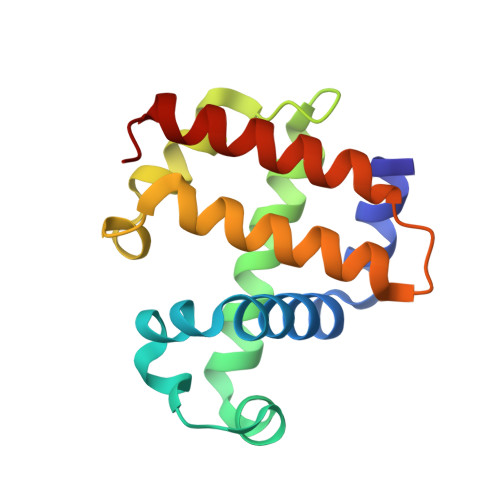Internal binding of halogenated phenols in dehaloperoxidase-hemoglobin inhibits peroxidase function.
Thompson, M.K., Davis, M.F., de Serrano, V., Nicoletti, F.P., Howes, B.D., Smulevich, G., Franzen, S.(2010) Biophys J 99: 1586-1595
- PubMed: 20816071
- DOI: https://doi.org/10.1016/j.bpj.2010.05.041
- Primary Citation of Related Structures:
3LB1, 3LB2, 3LB3, 3LB4 - PubMed Abstract:
Dehaloperoxidase (DHP) from the annelid Amphitrite ornata is a catalytically active hemoglobin-peroxidase that possesses a unique internal binding cavity in the distal pocket above the heme. The previously published crystal structure of DHP shows 4-iodophenol bound internally. This led to the proposal that the internal binding site is the active site for phenol oxidation. However, the native substrate for DHP is 2,4,6-tribromophenol, and all attempts to bind 2,4,6-tribromophenol in the internal site under physiological conditions have failed. Herein, we show that the binding of 4-halophenols in the internal pocket inhibits enzymatic function. Furthermore, we demonstrate that DHP has a unique two-site competitive binding mechanism in which the internal and external binding sites communicate through two conformations of the distal histidine of the enzyme, resulting in nonclassical competitive inhibition. The same distal histidine conformations involved in DHP function regulate oxygen binding and release during transport and storage by hemoglobins and myoglobins. This work provides further support for the hypothesis that DHP possesses an external binding site for substrate oxidation, as is typical for the peroxidase family of enzymes.
Organizational Affiliation:
Department of Chemistry, North Carolina State University, Raleigh, North Carolina, USA.

















